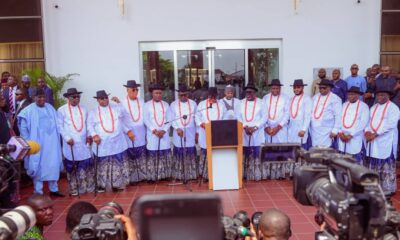Business
FG Spends N150bn On Fuel Subsidy Monthly, NNPC Admits
The Group Managing Director of the Nigerian National Petroleum Corporation (NNPC), Mele Kyari, has disclosed the Federal Government spends as much as N140billion to N150billion to subsidise premium motor spirit (PMS) otherwise called petrol, monthly.
According to Kyari, the open price of petrol has risen to N256 per litre.
With the present pump price of petrol pegged at N162 per litre, it means government is subsidizing the product by N94 per litre.
Kyari said petrol daily truck out has risen significantly to 103 million per litre.
He said, “If we are to sell at the market today at current exchange rate, we will be selling the product at about N256 to a litre. What we sell today is N162, so, the difference is at a cost to the nation”.
“The difference comes back to as much as N140billion to N150billion cost to the country monthly.
“As long as the volume goes up, that money continues to increase and we have two sets of stress to face, stress of supply and stress of foreign exchange for the NNPC. We may not see foreign exchange cheque taking place for importation”.
Kyari stressed at the meeting which had the Economic and Financial Crimes Commission (EFCC), Department of State Services (DSS), Nigeria Police Force (NPF), Nigeria Customs Service (NCS), Nigeria Security and Civil Defence Corps (NSCDC), and other relevant downstream and upstream stakeholders in attendance, harped on the need to find urgent solution to petrol smuggling challenge in the country.
He explained, “In very recent data, we see what we really want in the beginning of May and June, there was a day we load out about 103 million litres of PMS within one day across the depots. We know it is not required, we know it is inappropriate and we also know that something wrong is happening that somebody is chasing something.
“But we in NNPC, we are not in control of that, we are not in every depot, we don’t keep products in all the depot but when the volume goes down, it comes down to us, when there is tight in supply, it comes back to the NNPC and we solve the problem”.
The NNPC boss said that President Muhammadu Buhari had directed that smuggling must stop, adding that it was the reason for inviting all stakeholders to chart the way forward.
Stakeholders in the downstream sector of the petroleum industry have blamed distribution system and low pump price for the increasing rate of smuggling of petrol, out of Nigeria.
The stakeholders, who include marketers, depot owners and transporters called for synergy to check the activities of smugglers.
Speaking at a stakeholders meeting to work out synergy to tackle incidents of smuggling of petroleum products criminals, the Chairman of the Board of Directors of the Independent Marketers Association of Nigeria (IPMAN), Alhaji Aminu Abdulkadiri urged the Nigerian National Petroleum Corporation (NNPC) to release more products to its members.
Abdulkadiri noted that with over 20,000 filling stations across the country, IPMAM members sell directly to the Nigerian people.
He said, “I have been in this industry for over 30 years and there are underlying issues that I want the GMD to take cognizance of and this will go a long way in chasing who does what.
“One, we have almost 30,000 retail outlets in this country and both major marketers and DAPMAN have about 2000-3000, the rest belong to my members. But the truth there is who is responsible for storing and distributing this product? The bulk of this product is being distributed by DAPMAN.
“NNPC needs to work with IPMAN and DAPMAN ensure that marketers that have retail outlets that are viable for Nigerian consumers should be attached to each depot in this country. That way NNPC can track most of these products that are being either diverted or smuggled out.
“But so long as the source of distribution is not monitored and product are sold indiscriminately, the problem will continue”, he added.
On her part, Chairman, Depot and Petroleum Products Marketers Association of Nigeria (DAPMAN), Mrs. Winifred Akpani, said the group was concerned about the high volume of petrol consumption in Nigeria.
Akpani said it was difficult to determine the actual amount of petrol consumed in the country, pointing out, however, that the Department of Petroleum Resources (DPR) has critical role to play if smuggling was to end in the country.
“We as depot operators do not own all these stations but we sell a lot to people who have the stations. And one thing we always insist is where is your DPR licence not only are you going to show us your DPR licence we are going to cross check with the list that updated periodically and send to each depot by the DPR and it only on that basis that we sell product to you,” she added.
She noted with the resources and technology available in the industry, tracking the movement of trucks should not be a big challenge.
Also speaking, the National President of the Nigerian Association of Road Transport Owners (NARTO), Alhaji Yusuf Lawal Othman, called for closer monitoring truck outs at the depots.
According to him, “The system needs to be reorganized. I don’t see any reason why you have 200 filling stations in a local government that does not consume more than 45,000 litres.
“I also don’t see how the depot which normally do programme per day will programme quite a number of trucks to a local government which does not consume more 45,000 litres per day. It means that we are sleeping”.
Business
Lokpobiri Condemns Abandoned Refinery Project in N’Delta … Vows Revival
Business
FG Unveils Industrialisation Strategies In 2025 … To Conduct MSMEs Census
Business
Coy Strengthens Commitment To Nigeria’s Energy Future
-
Business3 days ago
Ekpo Urges For Domestic, Export Market Boost In Gas Supply
-
News16 hours ago
Kidnapped Anambra Lawmaker Found Dead Near 2nd Niger Bridge
-
Sports11 hours ago
Stakeholders To support 2025 ECOWAS Marathon
-
News3 days ago
NIS Begins Contactless Passport Application In Europe, Friday
-
Politics3 days ago
Grassroots Governance: Otu Signs Cross River Local Government Amendment Bill Into Law
-

 Niger Delta13 hours ago
Niger Delta13 hours agoC’ River Committed To Mangrove Restoration – Gov
-

 Politics10 hours ago
Politics10 hours agoPDP Crisis: BoT Urges Immediate Swearing-In Of Ude-Okoye As National Secretary
-

 News3 days ago
News3 days agoFubara Attends PDPGF Meeting In Asaba …..Back Court Verdict On National Secretary Position

